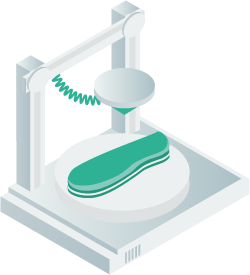Additive Manufacturing (AM), also known as 3D printing, is gaining popularity, especially in the medical sector. It offers significant benefits for MedTech solutions, such as 3D-printed joints, implants, and medical devices. AM provides the freedom to design unique, complex geometries and it enables small batch production. The use of stronger materials reduces product weight or volume, which broadens the spectrum of use. This empowers, amongst others, medical professionals to deliver efficient personalised solutions that precisely fit each patient’s body, not only for (surgical) body parts but also for orthopaedic and podiatric products.
Orthopaedic or podiatric products play a vital role in repairing and supporting the musculoskeletal system, addressing various issues like sports injuries, joint pain, and back problems. One example of such products is bespoke insoles, which fall within the specialty of the M3DSoles consortium. The project consortium consists of PLT Products BV and Voetencentrum Wender, in collaboration with the Fraunhofer Innovation Platform for Advanced Manufacturing (FIP-AM@UT), the University of Twente and the Fraunhofer Institute for Production Technology IPT. PLT Products is a renowned manufacturer and outsourcing partner of professional footwear, specialising in the production of custom-made insoles, amongst which 3D printed ones. Voetencentrum Wender is a market-leading, innovative foot care company, whose core activity is to provide medical services in the foot care industry.
In the realm of insoles, acknowledging the distinctiveness of each individual’s physical condition and unique feet, every insole produced is a bespoke product tailored to meet the specific needs of the patient.
The innovative, personalised 3D printed insoles developed by PLT Products comprise of two fundamental components. The bottom part of the insole, which is partly standardised, can be individually adjusted according to the foot position, diagnosis, and the underlying medical need. This part is finished with a cushioning cover layer, which stimulates even pressure distribution under the foot. This approach ensures that each patient receives a tailor-made solution that optimally addresses their specific needs and enhances overall quality of life.
The AMP project M3DSoles will enhance the design of patient-specific insoles, by optimising key parameters of the insoles shape through simulations. This approach ensures a higher level of personalisation for the soles. For faster optimisation results, a data-driven module will be developed, which recommends property settings based on the patient specific variables entered.
Upon completion of the project, the module is expected to offer valuable advice on parameters such as insole geometry, thickness, size, and material of the end product. The module will be an intelligent tool in the optimisation of personalised solutions and enhance the quality of life of the patient.









